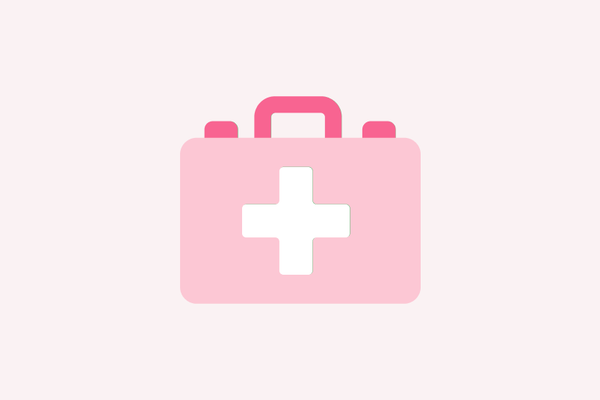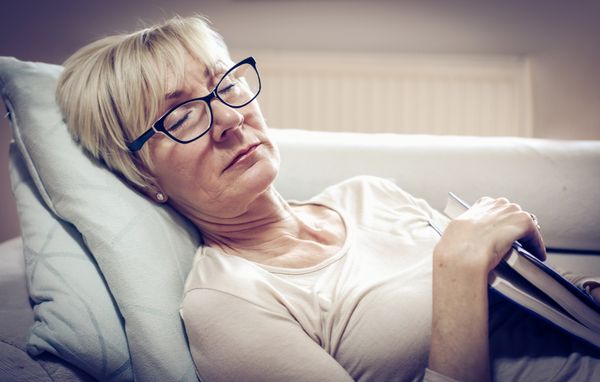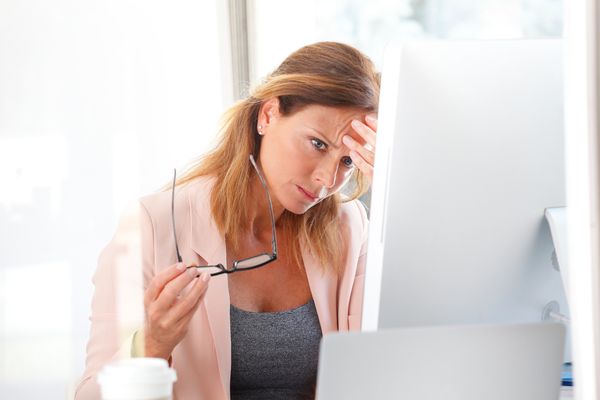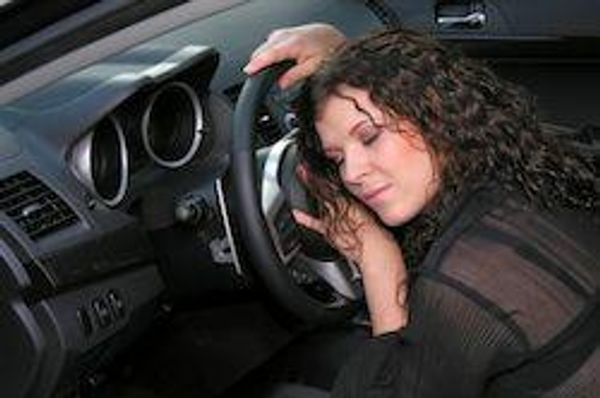This article has been archived. We will no longer be updating it. For our most up-to-date information, please visit our energy information here.
Do you feel exhausted before the day is over? Too pooped to play on weekends? Can't even begin to think about exercising or sex, or you run out of gas before working up a sweat?
Women of all ages seem to be suffering from an energy deficit these days.
Work and school demands, children's needs, money pressures, maintaining a household, caring for relatives, sustaining personal relationships, health concerns—it's amazing that any of us can sleep, let alone get the 7.6 sleep hours each night that the Bureau of Labor Statistics claims is clocked by working people ages 25 to 54 who have children. Or maybe you're able to get the eight hours of sleep that's best for most of us, but you still feel worn out.
Dietitian Dina Aronson, MS, RD, believes that fatigue has become the norm for many otherwise healthy women. They've simply accepted feeling tired for months or even years.
Our crammed lives reinforce the normalcy of tiredness. "Chronic stress is one factor that folks overlook," Aronson says. "Many don't realize how important stress is in affecting our energy levels."
Of course, there may be a medical reason for your exhaustion, such as chronic fatigue syndrome or thyroid disorder, so it's important to talk with your health care provider about any severe fatigue.
The majority of women—who don't have such conditions—can take on their low energy and tiredness problems themselves, without using sleep aids or other medications.
Work it out
You may have heard this improbable advice before: Getting more exercise can help you feel more energetic. "Many people think, 'If I'm feeling so fatigued, how am I going to bring myself to exercise?'" says Jessica Matthews, MS, an exercise scientist with the American Council on Exercise.
Yet the research (on real people, not mice) shows this to be true. Part of the reason for this effect comes from what happens when you exercise: your heart pumps more oxygen and nutrients into your bloodstream, your lungs and cardiovascular system work better and you feel more energetic.
What's more, the type of physical activity that works best for alleviating fatigue "is not that intense exercise that people feel they have to do," Matthews says. The notion that exercise has to be grueling in order to work keeps many exhausted women from lacing up their sneaks.
In reality, "the research found it's more beneficial [for restoring energy] to perform exercise at a leisurely pace," she adds. Doing just a little, at a low intensity level (such as walking or riding a bike at an easy pace) can help you feel less tired and more energized and can be the beginning of a positive relationship with exercise.
Getting results also takes less time than you probably have imagined. For people with low energy, Matthews says that exercising in 10-minute bouts is effective. Aim for three sessions in a day, but even one 10-minute effort is good.
"The mental benefits of exercise are the things people will notice right at the start—increased energy and positive mood," she says. "These are real motivators."
Restorative nutrition
Have you noticed how many women have so-called energy bars crammed in their purses, briefcases and baby bags? Most of these women aren't competitive or elite athletes and don't need the added fuel (that is, calories) found in these products. They buy them, instead, out of the belief that something called an energy bar will make them more energetic.
"One big mistake I find that people make when it comes to energy levels is trying to fix low energy with food—especially when you are not hungry," says Melinda Johnson, MS, RD, a national spokesperson for the American Dietetic Association and owner of Nutrition for Slackers, a counseling service in Chandler, Arizona. Johnson faults energy drinks as another "energy food" that typically has too many calories and too much caffeine, creating a false energy burst, followed by a drop.
Instead of adding calories to your daily food intake, you can help alleviate tiredness by better balancing the nutrients you take in. (by the way, don't diet unless you are seriously overweight and overeating—taking in too few calories increases stress, which reduces energy and leads to weight gain.)
Nutrients that can help restore your energy and reduce fatigue include mood-boosting omega-3 fatty acids, iron, vitamin D, B vitamins, zinc and magnesium, says Aronson, who is president of Welltech Solutions, a nutrition consulting company in Montclair, NJ.
"Food sources are superior to supplements [i.e., pills containing nutrients] because the foods include the cofactors, enzymes and phytonutrients that work with the vitamins and minerals to maximize their efficiency," she adds.
Aronson contends that getting more antioxidants from whole plant foods (fruits, veggies, beans, whole grains) and cutting foods containing a lot of sugar or white flour is essential for reigniting your energy level. She advises these energy-supporting ideas:
- Eat at least two fruits or vegetables at every meal.
- Eat one fruit or vegetable at snack times.
- Drink water all day (you get tired more easily when you're dehydrated).
- Always eat breakfast. Make it a meal with a balance of complex carbohydrates, protein and a little fat. Good options: whole-grain cereal or bread, nut butter, fruit.
- Eat mini-meals throughout the day to keep blood sugar levels and energy up.
- Go outside. "Light therapy may work because it stimulates vitamin D production," Aronson notes. The light raises endorphins (the body's feel-good chemicals) and helps regulate sleep. "I think spending time outdoors every day is a huge contributor in our fight against fatigue," she says.
Women's energy issues
Some low-energy problems arise at specific times in women's lives. In addition to getting more physical activity and sufficient sleep, dietitian Melinda Johnson has these suggestions:
- For menstrual-related fatigue: Tiredness may be due to hormonal changes, so eat small, frequent meals containing protein (helps keep blood sugar levels even) and drink water to stay hydrated.
- For pregnancy: Feeling run-down may be due to iron-deficiency anemia. You need more iron when pregnant, so check with your health care provider and take prescribed vitamins.
- While nursing: You need more fluid because you're giving out a lot of your body's fluid through breast milk. When you become dehydrated, you feel exhausted. Drink water throughout the day—enough so that your urine is pale yellow in color.
- For menopause and beyond: Eat regular meals and small snacks. Aim to have three food groups at every meal and two food groups for snack. A variety of foods will give you the nutrients to stay active. Drink water all day. Women in this group also may have fatigue due to hypothyroidism or sleep apnea, so if you're tired all the time, talk with your health care provider.
To evaluate your level of fatigue, check the brief questionnaire here.
For more on eating for lengthy exercise endurance, go here.







